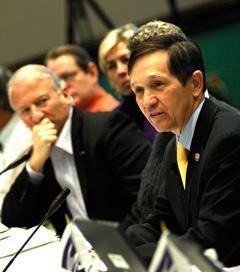“Dennis will be back, you can count on it; he’s on the right side of things.” I recall those words from a printer in Cleveland who had rented Dennis Kucinich a room in the back of her plant when that city’s former “boy mayor” was living in suddenly reduced circumstances. He was as sanguine then as he was Tuesday night when I spoke with him by phone about his gerrymandered eviction from the U.S. House of Representatives. Although he had just lost the position he has held for eight terms, by the end of our conversation he was optimistic and promised to continue the fight: “I am not about to abandon what I stand for.”
Most of the newly drawn district was made up of the Toledo home base of the fellow Democrat who defeated Kucinich in Tuesday’s primary, Rep. Marcy Kaptur, his more conservative colleague in Ohio’s congressional delegation. What remained of his Cleveland base, which he carried by 75 percent, was not sufficient to stave off the defeat the Republican-controlled state Legislature had intended when it drew the new boundaries in response to Ohio’s loss of two House seats. Kucinich knew it would be a tough primary fight, especially in the face of unexpected attack ads from his former friend in Congress.
With late returns still coming in Tuesday night, he was already thinking of new ways to energize the public discourse. I lightheartedly offered him a job writing a column for Truthdig paying in the low threes. But I was quick to add that I no longer had that spare studio in Los Angeles where he had spent four months writing a book after previously losing office. We’re all downsizing these days—unless you’re among the bailed-out bankers who are successors of those who four decades ago forced Cleveland into bankruptcy and Kucinich from the mayor’s office.
Back in 1979, I interviewed Mayor Kucinich for the Los Angeles Times, where I was working, and for Playboy. The Playboy interview caused him some discomfort with his solid base of Catholic voters, but they and other Clevelanders were warm to his populist instinct, the force that has driven him since his starkly impoverished youth. That populist passion caused him to rouse the ire of the banking elite that insisted that the city divest its municipal power plant to benefit a huge private power company.
When Kucinich refused to play ball with the downtown banking interests they pulled the plug on Cleveland finances and temporarily derailed his career. But 14 years later the Cleveland Plain Dealer, which has savaged him since his mayoral days, ran a headline conceding “Dennis Was Right” as it belatedly acknowledged that his refusal to sell the plant had provided needed competition to private power, resulting in lower energy costs for consumers.
Dennis early on made a choice to rise politically by faithfully representing his people rather than betraying them, as is the norm in politics. In our Playboy interview he made a joke concerning the criticism of all the idealistic young people who had joined him in administering Cleveland: “The real reason the young people I’ve appointed have been criticized is that they haven’t learned to steal yet. If they learned to take bribes they’d be praised as innovative and bright.”
So, too, Kucinich, who has been unfailingly resilient in advocating for the vulnerable, whether they were the working poor in his district or the folks our government bombed throughout the world. He was defeated this week by a fellow House member who prides herself on bringing home government bucks, particularly in defense expenditures. Her pitch to the voters was that her role on the House Appropriations Committee would help keep the pork barrel open, big-city Dem style.
Kucinich never competed in that way. He has been a national symbol of resistance to excessive government power and waste. He also has been a champion of social justice. His has been a rare voice, and one way or another it must continue to be heard. Simply put, when it came to the struggle for peace over war, Dennis was the conscience of the Congress. And he was always at the forefront in defending the rights of unionized workers who once formed the backbone of a solid middle class and who are now threatened with extinction.
Kucinich will surely be back for another turn in public life. As he put it in our Playboy interview:
“I appreciate Woody Allen’s humor because one of my safety valves is an appreciation for life’s absurdities. His message is that life isn’t a funeral march to the grave. It’s a polka.”
Dance on, Dennis.
Join us in defending the truth before it’s too late
The future of independent journalism is uncertain, and the consequences of losing it are too grave to ignore. To ensure Truthout remains safe, strong, and free, we need to raise $46,000 in the next 7 days. Every dollar raised goes directly toward the costs of producing news you can trust.
Please give what you can — because by supporting us with a tax-deductible donation, you’re not just preserving a source of news, you’re helping to safeguard what’s left of our democracy.
